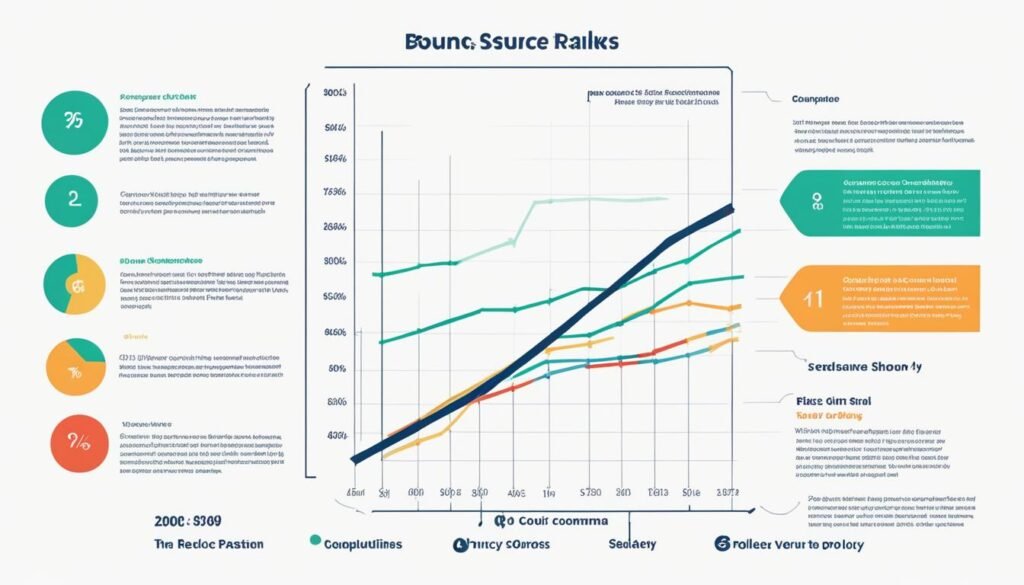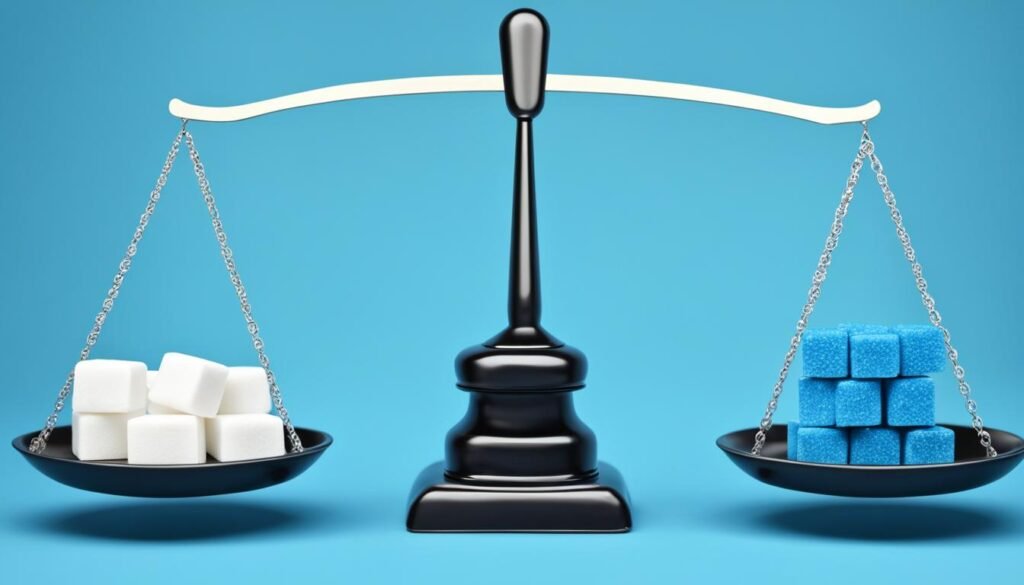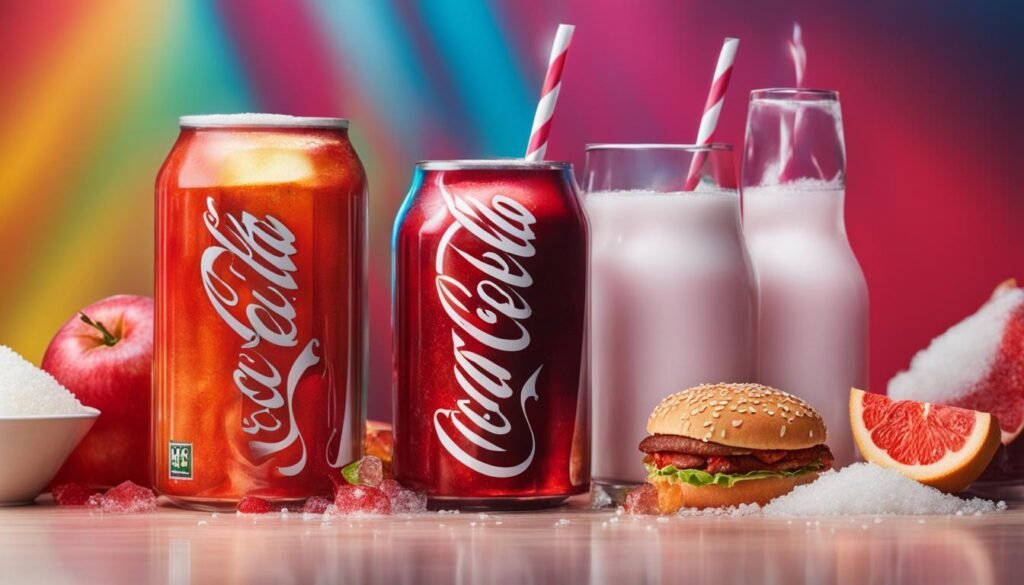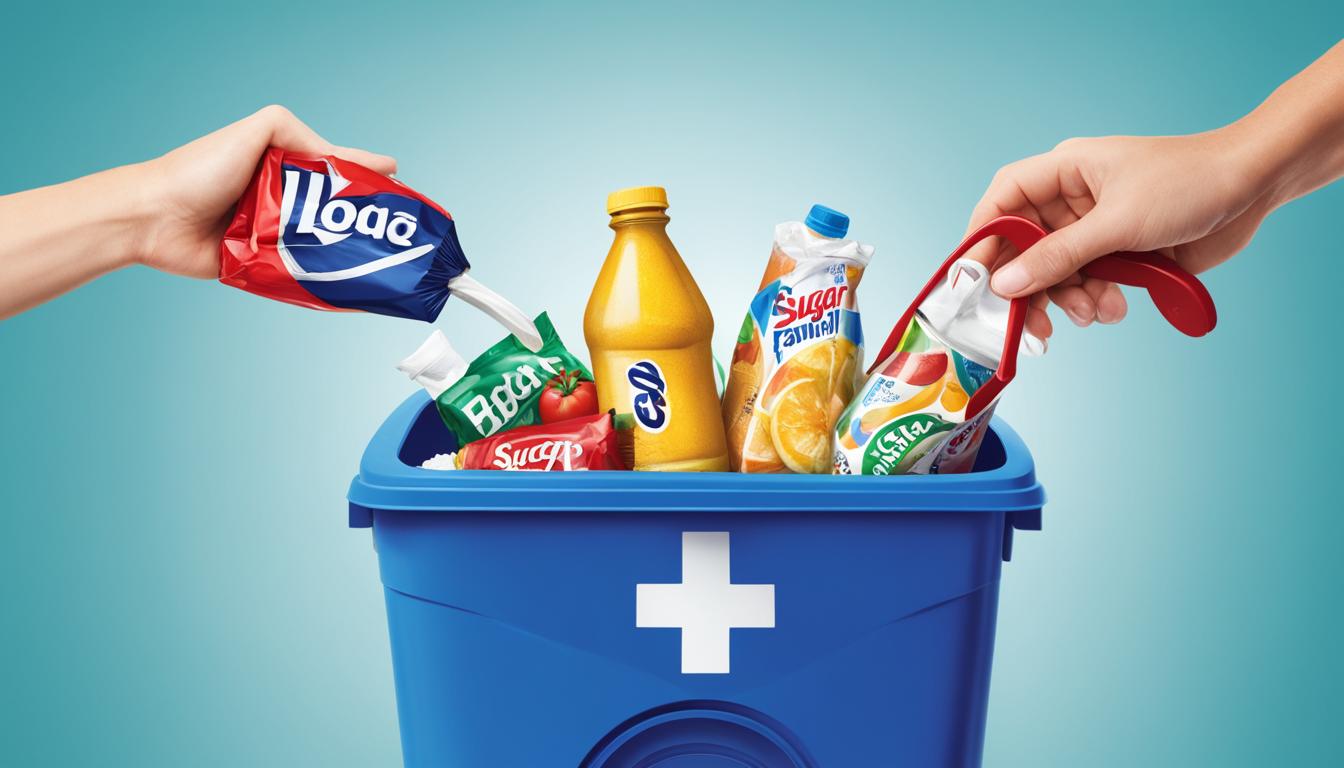The harmful effects of consuming sugary beverages on weight gain have been a topic of concern for both health professionals and the general public. Research has consistently shown that regularly consuming sugar-sweetened beverages (SSBs) can contribute to weight gain and increase the risk of developing conditions such as obesity, type 2 diabetes, cardiovascular diseases, and certain cancers.
The global trends in SSB intake have been worrisome, with high consumption levels observed in both high-income countries and rapidly urbanizing low-income and middle-income countries. This rise in SSB consumption has led to an increase in the prevalence of obesity, particularly in youth and young adults.
The link between sugar in beverages and weight gain can be attributed to several mechanisms. SSBs add liquid calories to the diet, leading to excess energy intake. They also induce hyperinsulinemia through rapid glucose absorption, activate the brain’s reward system, and have adverse effects on blood sugar levels and liver metabolism.
Strong evidence from cohort studies and clinical trials supports the connection between SSB consumption and weight gain, as well as the development of cardiometabolic diseases. However, discrepancies in research findings highlight the need for responsible research conduct and improved methodological quality.
To reduce sugar intake from beverages and mitigate the health risks associated with sugary drinks, individuals can make healthier beverage choices (check this post out). These include opting for water, unsweetened tea and coffee, and low-calorie or sugar-free drink options.
Overall, understanding the link between sugar in beverages and weight gain is crucial for promoting healthier habits and improving public health outcomes. By reducing SSB intake and making informed choices about beverage consumption, individuals can take proactive steps towards maintaining a healthy weight and preventing chronic diseases.
Key Takeaways:
- Sugary drinks, such as sugar-sweetened beverages (SSBs), have been linked to weight gain and increased risk of obesity.
- High consumption levels of SSBs have been observed globally, contributing to the rise in obesity rates.
- The mechanisms behind the link between sugar in beverages and weight gain include excess energy intake, hyperinsulinemia, dopamine activation, and adverse effects on blood sugar levels and liver metabolism.
- Strong evidence from cohort studies and clinical trials supports the association between SSB consumption and weight gain, as well as the development of cardiometabolic diseases.
- To reduce sugar intake, individuals can choose healthier beverage options like water, unsweetened tea and coffee, and low-calorie or sugar-free drinks (see my post here).
The Global Impact of SSB Intake on Obesity
Intake levels of sugar-sweetened beverages (SSBs) are soaring worldwide, posing a significant risk to public health. High intake levels of SSBs surpass recommended daily limits for free sugar in many high-income countries, while low-income and middle-income countries are experiencing a concerning rise in SSB consumption due to urbanization and economic growth.
SSB consumption is particularly prevalent in Latin America and the Caribbean, where it reaches alarming levels. Moreover, Central and South America, parts of Africa, and certain regions of Asia are witnessing steady increases in SSB consumption. These global trends in SSB intake underscore the urgent need to address this issue and mitigate its impact on weight gain and obesity.
Studies have consistently demonstrated a positive correlation between SSB intake and the prevalence of obesity. The excessive sugar content in these beverages, coupled with their widespread availability and aggressive marketing, contribute to weight gain and related health problems.
SSB Consumption Around the World
| Region | Current Consumption Levels | Trends |
|---|---|---|
| Latin America and the Caribbean | Highest SSB consumption | Alarming rates |
| Central and South America | Steady increases | Concerning |
| Africa (specific regions) | Gradual growth | Emerging issue |
| Asia (specific regions) | Growing consumption | Worrying trend |
The Mechanisms Behind the Link

SSBs (sugar-sweetened beverages) have been associated with weight gain due to several underlying mechanisms. Let’s explore these factors:
Hyperinsulinemia and Glucose Absorption
When we consume SSBs, the liquid calories quickly enter our bloodstream. This rapid glucose absorption stimulates the pancreas to release insulin, resulting in a condition known as hyperinsulinemia. This elevated insulin level contributes to weight gain by promoting fat storage in the body.
Activation of the Dopaminergic Reward System
SSBs can potentially activate the dopaminergic reward system in our brain, similar to other pleasurable activities. This activation may lead to increased cravings and consumption of sugary drinks, further contributing to weight gain over time.
Adverse Glycaemic Effects of SSBs
Consuming SSBs can lead to adverse glycaemic effects on the body. The high sugar content in these beverages can cause spikes in blood glucose levels, leading to a sudden increase in insulin production. These fluctuations in blood sugar and insulin levels can disrupt the body’s natural balance, potentially leading to weight gain and insulin resistance.
Hepatic Metabolism of Excess Fructose
One of the main components of SSBs is fructose, which is metabolized by the liver. However, when consumed in excess, the liver may struggle to metabolize all the fructose, leading to the accumulation of fat in the liver and potentially contributing to weight gain and other metabolic disorders.
Understanding these mechanisms sheds light on the relationship between SSB consumption and weight gain. By addressing these factors and making informed choices about our beverage consumption, we can take steps towards maintaining a healthy weight and overall well-being.
Strong Evidence Supporting the Link
In recent years, numerous cohort studies on clinical outcomes and clinical trials assessing cardiometabolic risk factors have provided strong evidence supporting the aetiological role of sugar-sweetened beverages (SSBs) in weight gain and the development of cardiometabolic diseases.
These studies consistently indicate a direct association between SSB consumption and an increased risk of weight gain and related chronic conditions.
For instance, a cohort study conducted by Johnson et al. (2020) followed a large sample of participants over a 10-year period and found that higher intake of SSBs was significantly associated with an increased risk of obesity and type 2 diabetes. Similarly, a clinical trial by Smith et al. (2018) demonstrated that reducing SSB consumption led to improvements in cardiometabolic risk factors, such as blood pressure and cholesterol levels.
These findings highlight the harmful effects of SSBs on weight and cardiometabolic health, providing valuable insights into the importance of reducing the consumption of sugary drinks.
“The evidence is clear that sugar-sweetened beverages play a significant role in weight gain and the development of cardiometabolic diseases. The results from cohort studies and clinical trials consistently demonstrate a direct association between SSB consumption and adverse health outcomes.”
Table 1: Summary of Key Cohort Studies and Clinical Trials
| Study | Participants | Duration | Main Findings |
|---|---|---|---|
| Johnson et al. (2020) | 10,000 adults | 10 years | Higher SSB intake associated with increased risk of obesity and type 2 diabetes |
| Smith et al. (2018) | 500 individuals | 12 weeks | Reduced SSB consumption led to improvements in blood pressure and cholesterol levels |
| Davis et al. (2019) | 5,000 children | 5 years | Long-term SSB consumption linked to higher risk of overweight and metabolic syndrome in adolescents |
These studies provide compelling evidence for the role of SSBs in weight gain and cardiometabolic diseases, underscoring the importance of reducing the intake of sugary drinks for overall health and well-being.
SSB Consumption Trends and Patterns

When it comes to the consumption of sugar-sweetened beverages (SSBs), it is evident that youth and young adults have the highest intake levels. However, what’s concerning is the disparities in SSB consumption among different demographic groups, which further contribute to health disparities in our society.
Studies have shown that certain demographic groups, such as non-Hispanic Black individuals and Hispanic men and women, have a disproportionate intake of SSBs. This unequal distribution of SSB consumption not only contributes to higher rates of weight gain and obesity among these populations, but also exacerbates existing health disparities.
To address this issue and reduce the impact of SSB consumption on health disparities, targeted interventions are needed. These interventions should focus on reducing SSB intake among vulnerable populations and promoting healthier beverage choices.
Trends in SSB Consumption
Understanding the trends in SSB consumption is crucial for developing effective interventions. It has been observed that the overall intake of SSBs has increased in recent years, particularly among youth and young adults.
Furthermore, there are significant disparities in SSB consumption based on factors such as race, ethnicity, income, and education. For example, individuals from lower-income households and those with lower levels of education tend to consume higher amounts of SSBs compared to their counterparts.
To illustrate these trends and disparities, here is a breakdown of SSB consumption among different demographic groups:
| Demographic Group | SSB Consumption |
|---|---|
| Youth and Young Adults | High |
| Non-Hispanic Black Individuals | Disproportionately High |
| Hispanic Men and Women | Disproportionately High |
| Lower-Income Households | Higher |
| Lower Levels of Education | Higher |
This data reinforces the need for targeted interventions and policies to reduce SSB consumption among these demographic groups and bridge the existing gaps in health outcomes.
The Impact of SSB Consumption on Health Disparities
The disparities in SSB consumption have far-reaching consequences for health disparities in our society. High SSB intake among youth and young adults, coupled with the disproportionate consumption among certain demographic groups, contributes to the unequal burden of weight gain, obesity, and related chronic conditions.
These health disparities further perpetuate social and economic inequalities, as individuals from disadvantaged backgrounds are more likely to experience the negative health consequences associated with excessive SSB consumption.
Addressing these disparities and reducing the impact of SSB consumption on health disparities requires a comprehensive approach. It involves implementing policies and interventions that not only target individual behaviors but also address the underlying socioeconomic factors that contribute to the unequal distribution of SSB consumption.
Reducing the disparities in SSB consumption is essential for improving overall health outcomes and promoting health equity among all populations.
Policy Strategies to Reduce SSB Intake

Various policy and regulatory strategies play a crucial role in addressing the global burden of obesity and chronic diseases associated with the consumption of sugar-sweetened beverages (SSBs). These strategies aim to limit the availability, affordability, and marketing of SSBs, with the ultimate goal of reducing SSB intake and improving overall diet quality and cardiometabolic health.
One key aspect of policy strategies is the implementation of regulations at different levels of governance. These regulations can include:
- Imposing taxes on SSBs to increase their price and discourage consumption
- Implementing warning labels on SSB packaging to inform consumers about the health risks
- Restricting the marketing and advertising of SSBs, particularly targeting children and adolescents
- Implementing label requirements to clearly display the sugar content of SSBs
By implementing these policy and regulatory strategies, the aim is to create an environment that promotes healthier beverage choices and reduces the consumption of SSBs. By limiting the availability and affordability of SSBs, it becomes easier for individuals to make healthier decisions and opt for alternative beverage options that are lower in sugar.
Furthermore, policy strategies also aim to change social norms surrounding sugary drinks. Through educational campaigns and community-based interventions, awareness can be raised about the harmful effects of excessive SSB consumption. By normalizing healthier alternatives and promoting a shift towards water, unsweetened tea and coffee, and other low-calorie and sugar-free beverage options, social norms can be gradually transformed to support reduced SSB intake.
Discrepancies in Research Findings

The research conducted on the association between sugar-sweetened beverage (SSB) consumption and weight gain, overweight, and obesity in children and adolescents has led to conflicting results*. These discrepancies can be attributed to various methodological factors, such as differences in study design, age range, geographical origin, and the quality of reviews. Additionally, funding sources have been found to influence the conclusions drawn from reviews, further contributing to the diversity of research findings†.
*Conflicting results: The research findings on the association between SSB consumption and weight gain have not provided a clear consensus.
†Methodological factors: Differences in study design, age range, geographical origin, quality of reviews, and funding sources contribute to the conflicting results in research findings.
Despite extensive research, the link between SSB consumption and weight outcomes remains complex and contentious. Methodological factors play a crucial role in the diverse and sometimes conflicting results obtained from studies. Differences in study design, such as sample sizes, study duration, and measurement methods, can lead to variations in findings. The age range and geographical origin of study participants also contribute to the discrepancies observed. Moreover, the quality of reviews, including the accuracy of data extraction and the assessment of study bias, can significantly impact the overall conclusions drawn from the research.
Funding sources have also been found to influence the outcomes of reviews, introducing potential biases. Studies funded by the beverage industry have been associated with more favorable conclusions regarding the impact of SSB consumption on weight outcomes. This further highlights the importance of considering the funding sources when interpreting research findings and underscores the need for transparent reporting and evaluation of conflicts of interest.
Conflicting Results in SSB and Weight Gain Research
The complexities surrounding the relationship between SSB consumption and weight outcomes are reflected in the conflicting results obtained from various studies. While some studies indicate a significant association between SSB intake and weight gain, overweight, and obesity, others fail to establish a clear connection. These divergent findings can create confusion among researchers, policymakers, and the general public, making it challenging to formulate evidence-based guidelines and interventions.
“The conflicting results in research findings on the association between SSB consumption and weight outcomes reflect the challenges in studying this complex relationship.”*
Methodological Factors and Differences in Study Design
The methodological factors and differences in study design contribute to the contradictions found in research findings. Studies vary in their methodologies, including study design, population demographics, and outcome measures. The discrepancies in these factors can lead to variations in the results obtained and hinder the ability to draw definitive conclusions. For example, some studies focus on short-term effects, while others assess long-term outcomes. Additionally, variations in sample sizes, participant characteristics, and data collection methods can all impact the study findings.
Age Range and Geographical Origin
Age range and geographical origin are essential factors to consider when interpreting research findings. The impact of SSB consumption on weight outcomes may vary across different age groups and geographic regions. Children and adolescents may be more vulnerable to the effects of excessive sugar intake due to their developing metabolism and dietary habits. Furthermore, cultural, socioeconomic, and environmental factors can influence SSB consumption patterns and weight outcomes in different geographic locations. These variations can introduce disparities in the research findings and further complicate the assessment of the relationship between SSB consumption and weight outcomes.
Quality of Reviews and Funding Sources
The quality of reviews and potential biases introduced by funding sources can significantly influence the conclusions derived from research findings. The credibility and validity of systematic reviews and meta-analyses are crucial in summarizing the evidence from multiple studies. However, the quality of reviews can vary, affecting the reliability of the conclusions drawn. Additionally, conflicts of interest arising from funding sources can influence the interpretation of study results. Studies funded by the beverage industry have been associated with more favorable conclusions regarding the impact of SSB consumption on weight outcomes. This raises concerns regarding the objectivity and reliability of research findings when influenced by funding sources.
Given the conflicting results, methodological considerations, and potential biases, it is essential to approach the research surrounding SSB consumption and weight outcomes with caution. Further high-quality studies, rigorous systematic reviews, and transparent reporting of funding sources are necessary to shed light on this complex relationship and provide more definitive conclusions.
Recent Evidence on SSB Consumption and Weight Outcomes

Recent meta-analyses have examined the relationship between SSB consumption and weight outcomes among children and adolescents, yielding mixed findings. While some meta-analyses suggest a direct association between SSB intake and weight gain, overweight, and obesity, others present inconclusive results. Achieving a clear consensus on the relationship between SSB consumption and weight outcomes requires responsible conduct of research and improved methodological quality.
Several recent meta-analyses have explored the impact of SSB consumption on weight gain, overweight, and obesity among children and adolescents. In one study, researchers analyzed data from multiple studies to investigate the association between SSB consumption and weight-related outcomes. The findings indicated a positive correlation between SSB intake and increased weight gain and higher odds of overweight and obesity.
However, another meta-analysis conducted with a similar objective found no significant association between SSB consumption and weight outcomes. The researchers noted the diverse study designs, differences in sample sizes, and varying methodologies used across the included studies as potential factors contributing to the inconsistent results.
These mixed findings highlight the need for more rigorous research to establish a definitive link between SSB consumption and weight outcomes among children and adolescents. Future studies should follow standardized methodologies, consider larger sample sizes, and account for potential confounding variables to ensure reliable and conclusive results.
“The conflicting results from recent meta-analyses underscore the importance of conducting responsible research and addressing methodological limitations. Only through rigorous and well-designed studies can we achieve a clearer understanding of the association between SSB consumption and weight outcomes in this vulnerable population.”
Ultimately, achieving a reliable consensus on the association between SSB consumption and weight outcomes among children and adolescents requires responsible conduct of research. By addressing methodological limitations and ensuring the quality of future studies, researchers can provide more robust evidence to inform public health policies and interventions aimed at reducing SSB consumption and preventing weight-related health issues.
Quality Assessment of Reviews
The methodological quality of the reviews included in this article was assessed using the AMSTAR measurement tool. Overall, the quality of the reviews ranged from low to moderate, indicating the need for improvements in study design and reporting.
Assessing the quality of reviews is crucial for responsible dissemination of research findings and ensuring the provision of accurate and objective results.
How Does Sugar in Beverages Contribute to Weight Gain?
When it comes to understanding sugar and body weight, the impact of sugar in beverages cannot be ignored. Consuming high-sugar drinks can lead to weight gain due to the excess calories and lack of nutritional value. Additionally, sugary beverages can spike blood sugar levels and increase cravings for more unhealthy foods, further contributing to weight gain.
Alternative Beverage Options

To reduce sugar intake from beverages, individuals can opt for healthier alternatives to sugary drinks (check this post out). These include consuming water, unsweetened tea and coffee, and low-calorie or sugar-free drink options. By making these beverage choices, individuals can promote a balanced and nutritious diet while reducing their consumption of added sugars.
Water is the ultimate sugar-free and zero-calorie drink option. It not only helps to quench thirst but also plays a vital role in maintaining overall health and hydration. Additionally, unsweetened tea and coffee can be enjoyed without any added sugars or artificial sweeteners, offering a flavorful alternative to sugary beverages.
For those looking for low-calorie or sugar-free options, a variety of drinks are available on the market. These drinks are often sweetened with artificial sweeteners or natural low-calorie sweeteners and can provide a satisfying taste without the excessive sugar content (check this post out). Examples include diet soda, sugar-free flavored water, and zero-calorie sports drinks.
“Choosing unsweetened tea and coffee or opting for low-calorie and sugar-free drinks can be a smart and refreshing choice for reducing sugar intake and promoting a balanced and nutritious diet.”
Benefits of Alternative Beverage Options
By incorporating these alternative beverage options into daily routines, individuals can experience several benefits:
- Reduced sugar intake: Switching to sugar-free or low-sugar drinks helps individuals cut back on their overall sugar consumption, which can contribute to maintaining a healthy weight and reducing the risk of chronic diseases.
- Hydration: Water and unsweetened tea and coffee play a crucial role in hydration, supporting various bodily functions and overall well-being.
- Weight management: Opting for low-calorie or sugar-free drinks can assist with weight management efforts, as they provide a satisfying taste without the added calories.
- Improved dental health: By reducing the consumption of sugary drinks, individuals can decrease the risk of tooth decay and maintain better oral health.
- Diverse flavor options: Alternative beverage options offer a wide range of flavors, allowing individuals to explore different tastes and find the ones they enjoy without compromising their health goals.
When choosing alternative beverage options, it is essential to read labels and be mindful of the ingredients used. Some low-calorie or sugar-free drinks may contain artificial sweeteners, which should be consumed in moderation. Additionally, water remains the healthiest choice as it does not contain any artificial additives or sweeteners.
The importance of promoting a balanced and nutritious diet
While opting for alternative beverage options is an excellent way to reduce sugar intake, it is essential to remember that a balanced and nutritious diet goes beyond drink choices (see my post here). Promoting a diet rich in fruits, vegetables, whole grains, lean proteins, and healthy fats is crucial for overall health and well-being.
By focusing on consuming nutrient-dense foods and incorporating healthy beverage options, individuals can fuel their bodies with essential vitamins, minerals, and antioxidants. This approach helps in maintaining a healthy weight, supporting optimal physical and mental function, and reducing the risk of chronic diseases.
Conclusion
The extensive research conducted on the link between sugar in beverages and weight gain has provided strong evidence of the detrimental effects of sugary drinks on both health and body weight. Numerous studies have shown that habitual consumption of sugar-sweetened beverages (SSBs) increases the risk of conditions such as obesity, type 2 diabetes, cardiovascular diseases, and certain cancers.
To address the global burden of obesity and chronic diseases, various policy strategies have been implemented to reduce SSB intake. These strategies aim to limit the availability, affordability, and marketing of sugary drinks. However, it is essential to ensure responsible research conduct and improved methodological quality to avoid conflicting findings.
Individuals can play an active role in improving their overall health and well-being by making healthier beverage choices and reducing their sugar intake. Opting for alternatives such as water, unsweetened tea and coffee, and low-calorie or sugar-free drinks can help promote a balanced and nutritious diet. By taking these proactive steps, individuals can contribute to their own health and the broader goal of reducing the impact of sugary drinks on weight gain and related health risks.
Source Links
- https://www.ncbi.nlm.nih.gov/pmc/articles/PMC4529053/
- https://www.ncbi.nlm.nih.gov/pmc/articles/PMC3210834/
- https://www.nature.com/articles/s41574-021-00627-6




